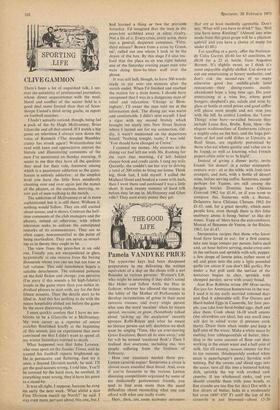CLIVE GAMMON
There's been a lot of anguished talk, I see, over the suitability of professional journalists, whose direct acquaintance with the mud,
blood and conflict of the soccer field is a good deal more limited than that of Scun- thorpe United's third string goalie, to report on football matches.
I hadn't actually noticed, though, being fed a pack of lies by Hugh Mcllvanney, Brian Glanville and all that crowd. If I watch a big game on television [ always turn down the voice of Kenneth ('The dreaded Wembley cramp has struck again') Wolstenholme but read with keen and appreciative interest the literate and illuminating comments of the men I've mentioned on Sunday morning. It seems to me that they have all the qualities they need for their role, foremost among which is a passionate addiction to the game. Soccer is entirely addictive: at the simplest level you have the little boys mindlessly chanting over and over again just the names of the players, or the curious, hurrying, in- tent gait of men walking to the match.
The addiction of Mcllvanney et al. is more sophisticated but it is still there. Without it,
nothing would follow. They are still excited about soccer, and it shows. Contrast the half- time comments of the club managers and the players, retired or' otherwise, with which television seeks to enliven the constipated remarks of its commentators. They are so often cagey, non-committal to the point of inarticulate. They are never as reveal- ing as in theory they ought to be.
The view from the press-box is an odd one. Usually you are encapsulated in glass, hygienically at one remove from the baying thousands whom you can see but not hear at full volume. This odd remoteness begets a suitable detachment. The coloured patterns on the field flicker and change; you perceive (I'm sorry if this sounds a bit high-falutin') trends in the game more than you notice in- dividual players to start with, say for the first fifteen minutes. Then the details start to be tilled in. And this has nothing to do with the minor hospitality dished out before the game by the more discerning clubs.
I must quickly confess that I have no am- bitions to be a Glanville or a Mcllvanney. My own career as a reporter of soccer matches flourished briefly at the beginning of this season, just an experiment that soon convinced me that I didn't want to spend all my winter Saturdays worried to death.
What happened _was that John Lovesey, who runs sport on the Sunday Times, said he wanted his football reports brightened up. He is persuasive and flattering. Just try it once, a Second Division match, he said. I'll get the goal-scorers wrong, I told him. You'll be covered by the local man, he soothed. If everything went wrong, they'd have his piece as a stand-by.
It was all right, I suppose, because he rang me early the next week. 'What about a nice First Division match up North?' he said. I was even more nervous about this one, but I
had learned a thing or two the previous Saturday. I'd imagined that the men in the press-box scribbled away in silent rivalry. Not a bit of it. Every crisis, every score, there was a general, desperate consensus. 'Fifty- third minute? Brown from a cross by Green, ote, called out one whom I took to be the doyen of the box. By this stage I'd also rea- lised that the place to sit was night behind one of the Saturday evening paper men who were doing blow-by-blow stuff over the phone.
It was still hell, though, to have 500 words ready to put over ten minutes after the match ended. When I'd finished and reached the station for a train home, I should have recognised that I was in a dangerous state of relief and relaxation. 'Change at Birm- ingham', I'll swear the man told me at the information desk. The dining oar was warm and comfortable. I didn't stint myself. I had a cigar with my second brandy which brought me nicely into New Street Station where I turned out for my connection. Od- dly, it wasn't mentioned on the departures board: 'Nothing tonight, mate,' I was told. 'You should have changed at Crewe.'
I counted my money. My excesses in the dining car had left me with 30s. Rushing for the train that morning, I'd left behind cheque book and credit cards. 1 rang my wife. Quaintly, she couldn't see her way to driving a total of 200 miles to bring me home. Think big, think fast, I told myself. I called the Midland Hotel and booked a room with bath, then I went there and confessed I was a little short. It took twenty minutes of hard talk before they let me in. Mcllvanney and Glan- ville? They earn every penny they get.


































 Previous page
Previous page